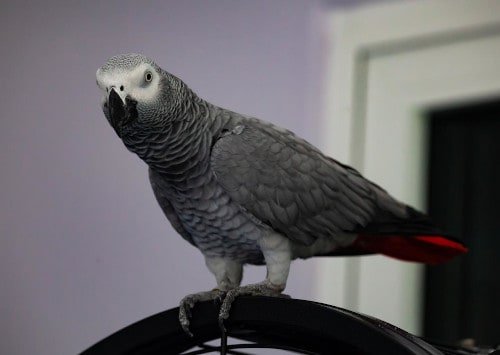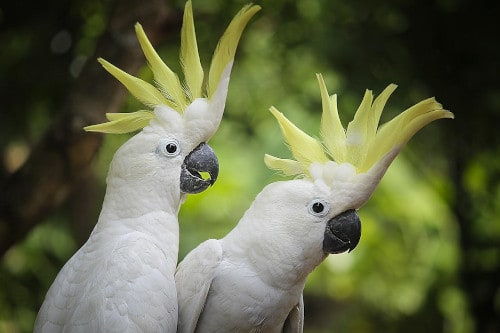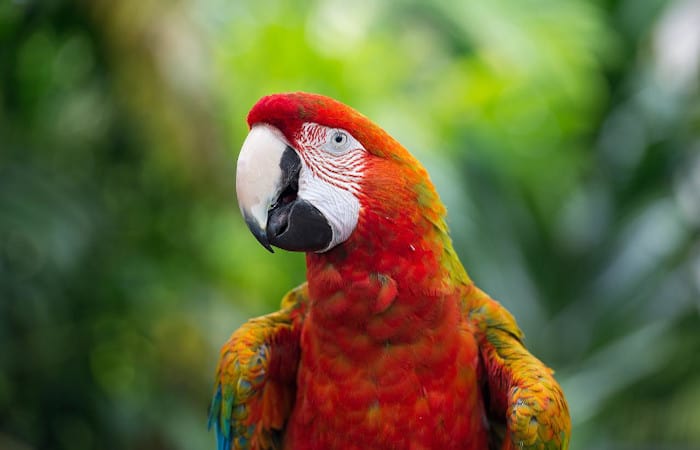Do parrots understand the words they say?
This is a question that has long been debated by scientists and bird enthusiasts alike.
Some people believe that parrots simply learn to mimic the sounds they hear, while others think that they actually understand the meaning of what they are saying.
In this blog post, we will explore both sides of this argument and try to come to a conclusion about whether or not parrots understand their own language.
Do parrots understand what they say?
For years, people have debated whether or not parrots understand the words they say.
While it is true that parrots are capable of imitating human speech, it is not clear how much they actually comprehend.
Some experts believe that parrots are simply repeating words without any real understanding.
Others argue that parrots are capable of basic communication, but their vocabulary is limited.
However, there is evidence to suggest that parrots may be more intelligent than we give them credit for.
Studies have shown that parrots are able to remember large amounts of information and use complex vocalizations to communicate with each other.
Additionally, some researchers have found that parrots can learn to associate words with specific objects and concepts.
As more studies are conducted, it becomes increasingly clear that parrots are far more intelligent than we previously thought.
While we may never know exactly what a parrot is thinking, there is no doubt that these fascinating creatures are capable of much more than just repeating words.
You may also like: What Is The Cheapest Talking Parrot? Prices Updated (Videos Inside)
Do parrots understand what you say?

For years, people have kept parrots as pets, and many of these owners report that their birds seem to understand what they say.
While it is true that parrots are intelligent animals, there is no scientific evidence to support the claim that they actually understand human language.
Instead, it is more likely that they are simply mimicking the sounds they hear.
Parrots have a natural ability to imitate sounds, and they often use this skill to communicate with other members of their flock.
When they are exposed to human speech, they may learn to mimic words and phrases in order to get attention or express their need for food or water.
There are a few key things to keep in mind.
First, there is a difference between mimicry and true understanding.
A parrot may be able to imitate the sounds of human speech but that doesn’t necessarily mean they understand the meaning behind the words.
Second, different parrots species have different abilities when it comes to mimicry.
For example, African grey parrots are considered to be the best at imitating human speech, while budgerigars are not as good at imitating complex sounds.
Finally, even if a parrot is able to imitate human speech, that doesn’t mean it will be able to carry on a conversation.
Parrots are not capable of producing the wide range of sounds that humans use to communicate, so they will never be able to say more than a few words.
In conclusion, there is no scientific evidence to support the claim that parrots understand human language.
However, many pet owners believe that their parrots do understand what they say, and there is no doubt that these fascinating creatures are capable of forming a close bond with their owners.
You may also like: At What Age Do Parrots Start Talking?
Can parrots have a conversation with you?

Whether or not parrots can carry on a conversation with you is a matter of some debate.
Most experts agree that parrots are capable of imitating human speech, and they may even be able to understand some words and phrases.
However, there is little evidence to suggest that parrots are capable of engaging in truly meaningful conversation.
Instead, it seems more likely that they simply mimic the sounds they hear without understanding the meaning.
Nevertheless, many parrot owners report that their birds seem to be able to hold brief conversations, and there is no doubt that these clever birds are capable of forming strong bonds with their human companions.
So even if they can’t hold a deep conversation, parrots still make fascinating and affectionate pets.
How do parrots communicate with each other in the wild?
While parrots are not known for holding deep conversations, parrots are capable of vocalizing a wide range of sounds.
In the wild, they use these sounds to communicate with their flock mates.
For example, they may make loud noises to warn of predators or softer cooing noises when content.
Parrots also use body language to communicate, and they are very good at reading the body language of others.
So, while they may not hold lengthy conversations as humans do, parrots are certainly capable of communicating with each other.
You may also like: Can Crows Talk Like Parrots? Watch These Amazing Videos
Do parrots know their names?
When it comes to animals and their ability to communicate with humans, few creatures are as famous as parrots.
These colorful birds have long been popular pets, thanks to their ability to mimic human speech.
Many parrot owners believe that their parrots know their names.
But do parrots really understand what you say, and know what they’re saying, or are they just repeating words they’ve heard before?
There’s no definitive answer, but there is some evidence that parrots may indeed understand the meaning of the words you’re saying.
For example, many parrots can learn to respond to their own names when called.
In addition, some parrots have been known to understand words in appropriate contexts. Some African grey parrots could respond to “What toy?”, “How many?”, “What color?”, and “What bigger?”.
Even if they don’t fully understand the meanings of the words you’re saying, it’s clear that parrots can respond to their own names and have a remarkable ability to learn and imitate human speech.
Can a parrot recognize its owner?
Pets can provide companionship, love, and laughter. They can also offer some pretty amazing abilities, like the ability to recognize their owners.
Some studies have shown that parrots may be able to recognize their owner’s face.
In one study, researchers found that parrots not only responded differently to recordings of their owner’s voice versus the voice of a stranger, but they also preferentially selected objects associated with their owner over objects associated with a stranger.
In addition, parrots have been known to develop close bonds with their owners, suggesting that they may be able to recognize individual faces and personalities.
So it seems that parrots may well be able to recognize their owners-just like other pets such as dogs and cats.
What parrot species can mimic human speech?
Many people are familiar with the phenomenon of parrots mimicking human speech.
However, not all parrot species are equally adept at this skill.
Some of the most popular pet parrots, such as budgies and cockatiels, have very limited vocal range and cannot learn to speak more than a few phrases.
On the other hand, species such as African grey parrots and macaws are highly intelligent and can quickly learn to mimic human speech.
In fact, African grey parrots are considered to be some of the best mimic artists in the animal kingdom, and their ability to replicate human speech has made them popular pets for centuries.
While it is impossible to know exactly how parrots learn to mimic human speech, it is clear that some species are better at it than others.
Conclusion
Do parrots understand what they say? It’s a difficult question to answer definitively, but there is some evidence that they may indeed understand the meaning of the words they’re saying.
In addition, parrots have been known to develop close bonds with their owners, suggesting that they may be able to recognize individual faces and personalities.
So it seems that parrots may well be able to understand and recognize their owners.
Parrots are fascinating creatures, and their ability to mimic human speech never ceases to amaze.
If you’re thinking of getting a parrot as a pet, be sure to do your research to find a species that is best suited for your home and lifestyle.
